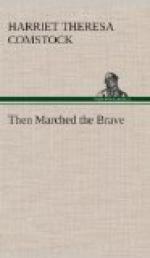“Yas, sah.” The colored man bowed humbly. “I’se been tellin’ dem we has eggs nouf, but the Dutchman he deaf as a stun wall, an’ de girl am dat sot, dat your own self couldn’t be sotter, sah. She done say her folks ‘prived demselfs of food an’ drink, sah, to save dese eggs fur your excellency, an’ she goes on tu say, sah, dat she done been habbin’ de debbil’s own time gettin’ past de lines wid de eggs. She’s been ’sulted by de British and odder hard things. She won’t go, sah, till I done tell you all dis rubbish.”
“Bring her in,” quietly said the listener.
Washington never slighted the humble, and, besides, messages were sent in odd ways. It was always better to be willing to listen. The black man departed, muttering, and presently returned, showing the lame girl in with no very good grace.
“Dat am de General!” he explained, shutting the heavy door after the limping figure.
There was no need of explanation. The eyes under the drooping frill grew joyous at the sight of the honored face. The heart under the coarse cotton frock beat high with pride, and—yes, shame, for how was the boy to make himself known?
“Pray be seated,” the deep voice was saying. “You are weary and you have taken chances of danger to reach me with your gift.”
Andy sank into the nearest chair.
“I appreciate your devotion and unselfishness, but I would advise no future attempts to pass the British lines for such a thing.”
“There were other reasons, sir,” said Andy. Washington came nearer.
“I fancied so,” he said, “and they are?”
Andy drew the basket of eggs to him, and unwrapped several, handing the papers to Washington. The General took them, crossed to the window, and for a few moments pieced the bits together carefully. Then he read. Andy watched him, remembering that other face in the greenhouse on the never-to-be-forgotten night.
“Where did you get these?” he said suddenly. Andy stood up leaning upon his crutch.
“A messenger, in time of danger, must come as he may, sir,” he said, bravely. Then tearing off the bonnet he added:
“Andy McNeal, at your service, sir!” Washington’s face never betrayed him, but a glad look came to the overweary eyes. He extended his hand, and grasped Andy’s.
“I remember!” he said. “You have been true to your trust. And now for the story.”
Sitting in the stately room of the mansion, opposite the great General, Andy McNeal told his story. Try as he might, his voice would break, but he thought no shame of his weakness, for the keen eyes looking into his own were often dim.
“I asked a great thing of Nathan Hale,” said the General at last, “but he gave it willingly. Andy McNeal, you have been a faithful friend to as great a hero as the Revolution will ever know. Many offer their lives. He offered his honor. Willing was he to die, and to die dishonored by the many. Some day his country will understand.”




